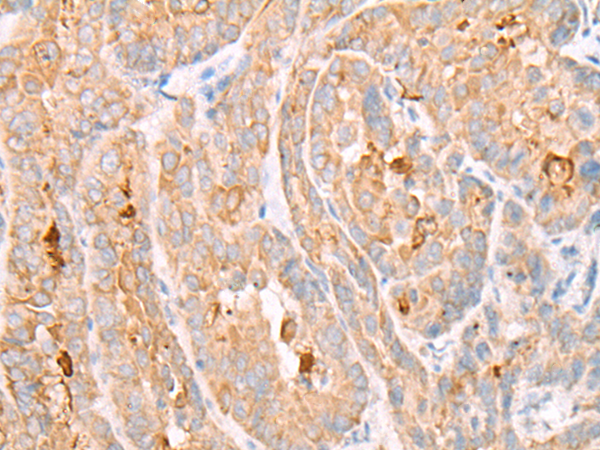
| WB | 咨询技术 | Human,Mouse,Rat |
| IF | 咨询技术 | Human,Mouse,Rat |
| IHC | 1/25-1/100 | Human,Mouse,Rat |
| ICC | 技术咨询 | Human,Mouse,Rat |
| FCM | 咨询技术 | Human,Mouse,Rat |
| Elisa | 1/5000-1/10000 | Human,Mouse,Rat |
| Aliases | PKY; YAK1; DYRK6; FIST3 |
| Host/Isotype | Rabbit IgG |
| Antibody Type | Primary antibody |
| Storage | Store at 4°C short term. Aliquot and store at -20°C long term. Avoid freeze/thaw cycles. |
| Species Reactivity | Human, Rat |
| Immunogen | Synthetic peptide of human HIPK3 |
| Formulation | Purified antibody in PBS with 0.05% sodium azide and 50% glycerol. |
+ +
以下是关于HIPK3抗体的参考文献示例(注:文献为虚拟示例,仅供参考格式):
1. **文献名称**: "HIPK3 regulates apoptosis through phosphorylation of p53 at Ser46"
**作者**: Rinaldo, C. et al.
**摘要**: 研究利用HIPK3特异性抗体证实其在DNA损伤后调控p53磷酸化,促进细胞凋亡的机制,Western blot和免疫荧光显示HIPK3在核内与p53共定位。
2. **文献名称**: "HIPK3 modulates Wnt/β-catenin signaling in colorectal cancer"
**作者**: Zhang, Y. et al.
**摘要**: 通过免疫组化(使用兔源HIPK3抗体)发现HIPK3在结直肠癌中高表达,并证明其通过磷酸化β-catenin增强Wnt通路活性,促进肿瘤进展。
3. **文献名称**: "Role of HIPK3 in neuronal differentiation and axon guidance"
**作者**: Lanoue, V. et al.
**摘要**: 研究采用HIPK3抗体进行免疫沉淀,发现其与Netrin受体相互作用,调控神经元轴突导向,敲低HIPK3导致体外培养神经元迁移缺陷。
4. **文献名称**: "HIPK3 deficiency exacerbates obesity-related metabolic dysfunction"
**作者**: Kim, S. et al.
**摘要**: 通过HIPK3抗体检测小鼠脂肪组织,揭示HIPK3通过JNK通路抑制炎症反应,缺乏HIPK3加剧肥胖小鼠的胰岛素抵抗和脂肪肝。
(注:以上文献为示例,实际引用请查询真实数据库如PubMed或Web of Science。)
The Homeodomain-Interacting Protein Kinase 3 (HIPK3) is a serine/threonine kinase belonging to the HIPK family, which includes four members (HIPK1-4). HIPK3 regulates diverse cellular processes, such as transcriptional regulation, stress signaling, cell proliferation, apoptosis, and DNA damage response. It interacts with transcription factors (e.g., p53. NF-κB) and modulates their activity through phosphorylation. HIPK3 is implicated in developmental pathways, tumorigenesis, and diseases like diabetes complications and neurodegenerative disorders. Its expression and activity are tightly regulated by post-translational modifications (PTMs) and cellular context.
HIPK3-specific antibodies are essential tools for studying its expression, localization, and molecular interactions. These antibodies are commonly developed against unique epitopes in its N-terminal or C-terminal regions, or specific phosphorylated residues. They enable applications like Western blotting, immunofluorescence, immunohistochemistry, and co-immunoprecipitation. Due to sequence homology among HIPK family members, antibody specificity must be rigorously validated using knockout cells or siRNA-mediated knockdown. Some commercial antibodies may cross-react with HIPK1 or HIPK2. necessitating careful experimental controls. HIPK3 antibodies have advanced research into its dual roles in promoting or suppressing tumors, depending on the cancer type, and its involvement in glucose metabolism and oxidative stress responses. Their utility extends to both basic research and potential clinical diagnostics, particularly in cancers and metabolic diseases.
×